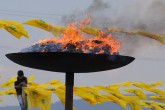There are only two days left until the March 30 local elections, which will determine the next decade of politics in Turkey.
All political leaders are met by cheering crowds at rallies around the country. There is no doubt that the AK Party displayed quite a show of strength when 2 million people showed up at its Istanbul rally last Sunday. What is the purpose of this courtesy towards a party and a leader that have been accused of corruption and civil authoritarianism with the Dec. 17 operation?
The AK Party is one of the parties that has been in power for the longest period of time in our history of democracy. Since coming to power with the 2002 general election, the AK Party and its leader Erdoğan have continually been the focal point of discussions. Everything about it, from its name abbreviation to its political identity and cadre, has been questioned. AK Party executives have been accused of having a hidden agenda due to their “Islamist” background.
When the AK Party came out as the winner of the election, it was then hoped that they would fail in resolving the economic crisis and foreign policy problems of the 1990s, but the AK Party overcame these criticisms by successfully conducting the EU membership process. The AK Party represented Turkey’s democratization discourse and its practice better than opposition parties.
More importantly, the AK Party has been able to survive several tutelary coup attempts in the time it has been in power. The April 27 memorandum, the closure case and the Ergenekon and Sledgehammer cases are only a few of these. The common point for all of these attempts is the desire of non-political actors to purge the AK Party in a bid to organize political life in Turkey. The last link in this chain is the Dec. 17 operation.
The AK Party is once again facing attempts by non-political actors trying to design politics. This time, illegal wiretappings of state officials, including Prime Minister Erdoğan himself, have been recorded and leaked to social media platforms. The objective is clear: a desire to get rid of an undefeatable party and its leader. The AK Party and Erdoğan are not wanted as the principal actors leading Turkey’s transformation.
Erdoğan’s resistance to tutelary conspiracies and the commitment of AK Party voters enrages the opposition, and makes more aggressive those who plot to rid Erdoğan through tape-politics.
Societal groups, intellectuals and journalists who are against the AK Party are uniting in their opposition to Erdoğan. They ask this leader, who has never been beaten at the ballots, to admit defeat by claiming that he has caused polarization among the people.
It is the simple truth that Turkish politics is approaching the three upcoming elections in an atmosphere of increased polarization and tension.
This is nothing new.
What is interesting, however, is that the current polarization is happening at a time when Turkey’s economic performance is good, terror has ended and there is an ongoing resolution process.
What is even more interesting is that the blame of polarization is placed on the strongest political actor in Turkey’s transformation, Prime Minister Erdoğan. This desire to put the blame on Erdoğan has turned into a call of “admit defeat,” despite a possible victorious outcome at the elections.
A leader, despite being chosen by the national will of the people, is being called on to admit defeat. This call for admitting defeat is in essence the confession of impotence of an elite Jacobinism. It is a discourse created by unsuccessful actors who are unable to reach people through elections.
Anti-Erdoğanism is dragging the opposition towards a pathological condition in which they see themselves as weak players in the game of democracy. Emphasizing the need for a unifying political language after the elections is of course a prudent call.
However, radicalizing the criticism of authoritarianism by calling for “admission of defeat despite victory at the ballots” is by no m
In this article
- Domestic Policy
- Opinion
- 1990
- 2002
- Anti-Erdoğanizm
- Elections
- EU Membership
- European Union (EU)
- Global Actors | Local Actors
- Gülen Movement
- Islam
- Local Elections
- March 30
- Opposition
- Prime Minister
- Recep Tayyip Erdoğan
- The President of the Republic of Türkiye
- Turkish Local Elections
- Turkish President
- Türkiye's Justice and Development Party | AK Party (AK Parti)


